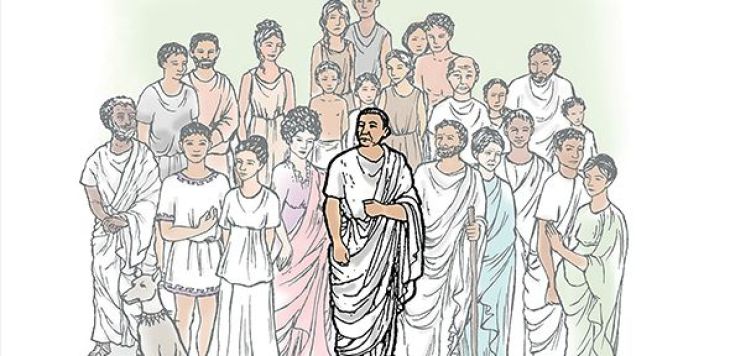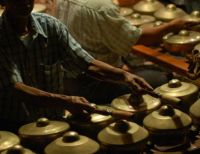Breaking news from 79 CE: Caecilius has a daughter. Barbillus is a Greco-Syrian man of colour. Enslaved people aren’t always happy. Metella is reading in the atrium.
These statements may read like indecipherable babble to some, but for students of Latin, they are among the most notable changes in the new edition of the Cambridge Latin Course: the leading textbook in the ancient language.
The course, a mainstay of Latin learning in British schools since the 1970s, has something nearing cult status with its fans. Its vivid stories, beginning in Book One with the adventures of a Pompeiian family featuring Caecilius, his wife, Metella, son, Quintus, and cook, Grumio, have inspired fan fiction, artistic tributes and even a cameo on Doctor Who.
The newly-published fifth edition represents one of the most significant new editions in its 50-year history. It draws on a wider range of sources and on new scholarship to give a more accurate, evidence-based picture of the classical world. In doing so, it better prepares students to engage with classical works and to think critically about the past, while addressing concerns raised by teachers, academics and students about the representation of women, enslaved people, and minorities in the Roman world.
While the original cast are as central as ever, new characters have been introduced, stories rewritten and features updated. Women have greater prominence (Caecilius has a new daughter called Lucia, for example), readers learn more about the lives of enslaved people, and the multicultural reality of Rome’s vast, intercontinental empire is represented in greater detail.
The course, written by the Cambridge Schools Classics Project at the University of Cambridge, has been informed by a fact-finding exercise in 2018 which involved school visits, surveys and interviews with hundreds of teachers and pupils, confirmed other long-held doubts about representation in the course books, prompting a more thorough reassessment.
Caroline Bristow, director of the Cambridge School Classics Project, said: “The aim has always been to introduce students to the complexity of the Roman world and get them to think critically about it while learning Latin. That prepares them to engage more thoroughly with authentic classical sources. The feedback we got told us we weren’t doing enough in that regard.”
Girls were especially keen to see more of the female characters – many had already started inventing their own backstories for them.
The stories in the new edition are, as ever, rooted in historical research, but expand women’s roles and devote more attention to their lived experiences. Lucia, for example, is being pushed into an arranged marriage in Book One. Caecilius also hires a female painter, Clara, to introduce students to the fact that poorer Roman women had to work as well as men.
Bristow said: “We wanted to provide students with a more rounded picture of people and events, while ensure the stories remain historically grounded. We’ve done that by drawing from that wider range of sources and events.”
This also helps to address the challenges that inclusion, access and minority representation can present for Classics educators. In particular, research highlights the imposter syndrome that people of colour feel when encountering the inaccurate, but standard, depiction of Rome as predominantly white. Other studies have shown that without being prompted to see diversity, even students of colour automatically make this assumption about the Roman world – a finding backed up by teachers’ experiences in the classroom.
Responding to this, greater attention was given to cultural diversity in the new edition. For example, Barbillus, a wealthy Greco-Syrian merchant character, features more prominently and is clearly presented as a person of colour. His early presence in the stories is partly intended to challenge another general misconception, that such people were always enslaved.
Jasmine Elmer, a Classics educator and media personality whose work focuses on trying to broaden access to, and understanding of, the ancient past, was one of several experts who reviewed the new edition. “We’ve tended to take an all-white view of an empire that clearly wasn’t,” she said. “If you’re a person of colour, it’s natural to wonder whether people like you were even there. The new course seems to be braver about those issues. It doesn’t run away from complicated subject matter; it turns it into teaching points.”
Enslaved characters were, in earlier editions, sometimes depicted in simplistic terms: as “happy”, “hard-working” or “lazy”. In the new edition, slavery is now depicted through the eyes of its victims, focusing on their anxieties and gruelling lives.
Other changes reflect developments in historical scholarship since the series was last updated. Ingo Gildenhard, a Professor of Classics at Cambridge, advised the production team on a section on gladiators in Book One. Traditionally, gladiatorial combat has been presented as a strange, bloodthirsty aspect of Roman culture. Without ignoring its horrors, modern research nonetheless shows the reality was more complex: arena combat also stirred Roman audiences because it reinforced key contemporary values, such as martial prowess.
Teaching materials in the new edition draw attention to that more nuanced perspective. “It’s essential that instead of brushing aspects of Roman culture under the carpet, we look at it in the round,” Gildenhard said. “Part of this is about empowering teachers with new scholarship they might not have encountered. It’s also about inviting students to think critically about the past and its relationship to the present. That’s a valuable skill whether or not you end up doing Latin long term.”
Pupils and teachers have tested the new edition and responded positively. One young reviewer told the team: “I like that Lucia is educated, but I would like to know whether she actually wants to marry or not.” Of Clara, another commented: “It’s good that Caecilius is hiring women”.
Bristow said: “We sometimes get told that children just want to learn the language, study the amazing things Romans did and dress up as gladiators,” she said. “There’s lots that was inspiring, but this was a complex world. We’re teaching children to be Classicists. We’re not teaching them to be Romans.”
This story was first published by Cambridge's Faculty of Education.







